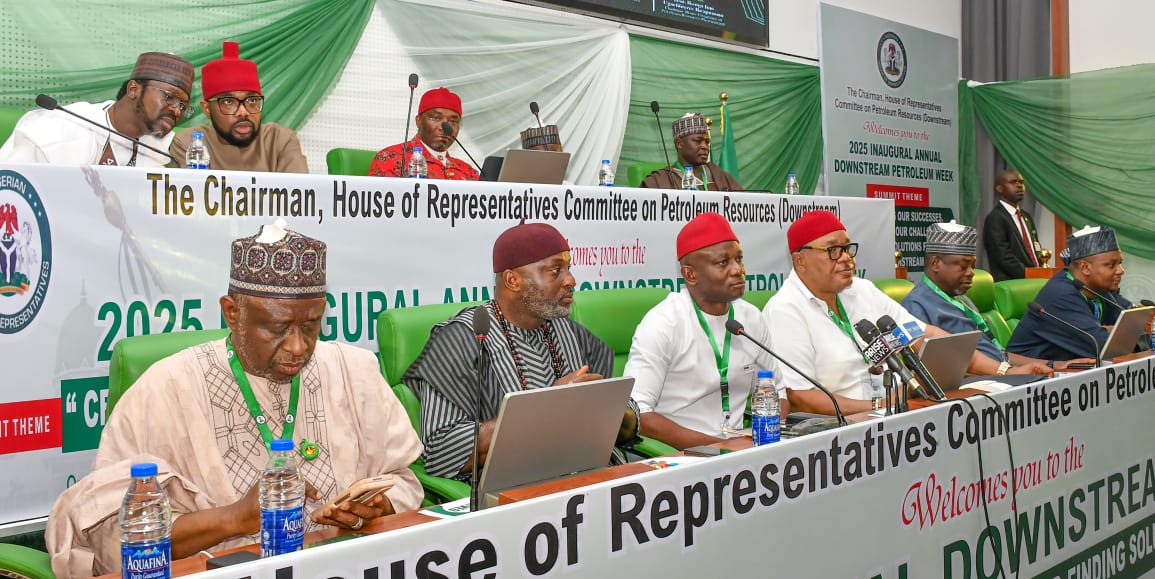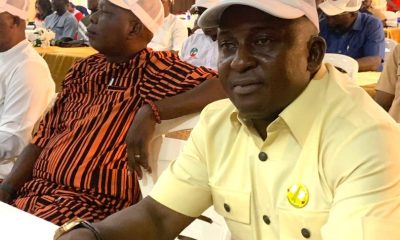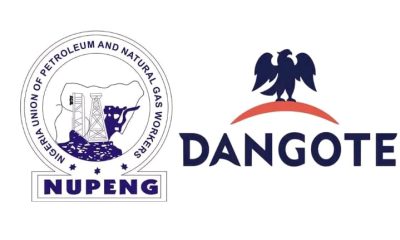National
Use Dialogue, Not Confrontation To Address Disputes With Dangote Refinery, Reps Urges Labour Unions

…Nigeria’s Oil, Gas Sector Witnessing Positive Revival Under Tinubu- Speaker Abbas
By Alkassim Bala Tsakuwa, Abuja
The Chairman House of Representatives Committee on petroleum resources downstream, Hon. Ikenga Ugochinyere has urged labour unions and stakeholders in the oil industry to engage in constructive dialogue to resolve their dispute with Dangote Refinery.
He made the call in his address at the ‘2025 Inaugural Annual Downstream Petroleum Week’ themed “Celebrating Our Successes, Confronting Our Challenges and Finding Solutions for the Petroleum Downstream Sector” held on Monday.
According to him, the Committee is aware of the recent dispute between Dangote Refinery and sector unions saying that while such issues are not uncommon in developing economies, they must never be allowed to undermine productivity or national stability.
Hon. Ugochinyere therefore urged both the labour unions and industry operators to always pursue dialogue over disruptions at all times, assuting them that, the parliament is always ready to facilitate peace, fairness, and mutual respect in all industrial engagements.
The Committee Chairman added that the Downstream Week is designed to be a recurring space for national dialogue, where they assess policies, evaluate progress, and celebrate excellence, toward a shared vision for a competitive and transparent downstream sector.
He said, “Today, Nigeria proudly boasts of expanding refining capacity and industrial growth across the energy value chain.The results are already visible. Indorama Petrochemicals has expanded its urea and fertilizer capacity to 2.8 million metric tonnes per annum, advancing agriculture and gas utilization.
“Waltersmith Modular Refinery in Imo State is expanding from 5,000 to 50,000 barrels per day, showing the promise of indigenous enterprise.OPAC Refinery in Delta, and similar projects in Edo and Rivers, continue to advance.
“And the Dangote Refinery, at 650,000 barrels per day, now stands as Africa’s largest, redefining our refining landscape and boosting regional energy stability. These developments, supported by over $13 billion in new upstream investments in 2024 alone, are clear signals of renewed investor confidence in Nigeria’s energy sector.
“Distinguished guests, one of the most commendable policy actions in recent times is the Nigerian Upstream Petroleum Regulatory Commission’s (NUPRC) enforcement of the Domestic Crude Oil Supply Obligation (DCSO) on all producers in Nigeria. This bold move ensures that local refineries, including modular and conventional operators have guaranteed access to crude feedstock before export allocations are made.
In his opening remarks, the Speaker of the House of Representatives, Hon. Tajudeen Abbas said that the oil and gas industry, especially the downstream sector, is witnessing an unprecedented revival under the progressive leadership of President Bola Ahmed Tinubu, GCFR.
The Speaker who was epresented his Deputy, Hon. Benjamin Kalu, noted that the conference, is remarkable and a timely reminder that Nigeria is full of success stories, and that the challenges facing the country are not insurmountable.
He added that, with collaboration, quality assurance and self-evaluation by critical stakeholders, solutions are bound to emerge.
According to him, the effective take-off of the Dangote Refinery marked a turning point in the nation’s quest for energy self-sufficiency adding that, the anticipated emergence of other private indigenous refineries made it imperative for the National Assembly to continue to create a functional environment for industries to thrive.
Speaker Abbass said the outcome of conferences such as this not only make the laws the parliament makes more pertinent and productive, but ensures that it will receive the avid cooperation and support of industry leaders.
He therefore urged the stakeholders to come up with innovative and creative solutions that will revamp the petroleum downstream sector, contribute to the overall development of the economy and positively impact the country as a whole.
He said, “As I look around at the quality of representation here, I feel confident that this event will become one of the most defining moments in the evolution of the downstream petroleum sector. Our hope is that as thinkers, innovators, workers and policy advocates, your collaboration will finally reshape the industry, setting agenda for growth, transparency and sustainable practices.
“I therefore commend the Chairman of the House Committee on Petroleum Resources, Hon. (Barr.) Ikeagwuonu Ugochinyere, and the rest members of the Committee, for conceiving and convening this historical national conference, with stakeholders like the NNPCL, PENGASSAN, the Dangote Group, and all the other oil and gas-affiliated associations represented here today. Your participation underscores our shared commitment to progress and reform. Together, we represent the full value chain—policy, regulation, labour, production, and investment, working in one accord to build a stronger energy sector.
“Indeed, agenda-setting programmes, such as this conference, which tend to galvanise critical stakeholders in the petroleum downstream sector, not only foster inclusiveness and commitment to genuine national development, but also reinforce citizens’ trust in the commitment of the National Assembly and government institutions in driving sustainable development.
“The evolution in the petroleum industry today has been made possible by the landmark passage of the Petroleum Industry Act (2021), a comprehensive, sweeping legislation that reformed the governance, administration and fiscal framework of the Nigeria Petroleum Industry.
“That law restructured the NNPC, transforming it into a commercial entity and established such regulatory bodies as the Nigeria Upstream Petroleum Regulatory Commission, NUPRC, and Nigeria Midstream and Downstream Petroleum Regulatory Authority, NMDPRA, thus renewing investors’ confidence, reducing oil pilferage, promoting transparency and competition, and generally improving operational efficiency.
“Our legislative responsibility has always been to craft policies, enact laws, and provide the oversight that will strengthen the downstream sector and ensure that it contributes to a more secure, efficient, and resilient Nigerian economy. This conference therefore provides an invaluable opportunity for improved legislation.
“By bringing together government, industry, labour and investors to share perspectives, confront challenges, and develop practical, forward-looking solutions to the challenges in the sector, this forum ensures that the conversations to be had here will inform the framework of any policy in the energy landscape for years to come.”













